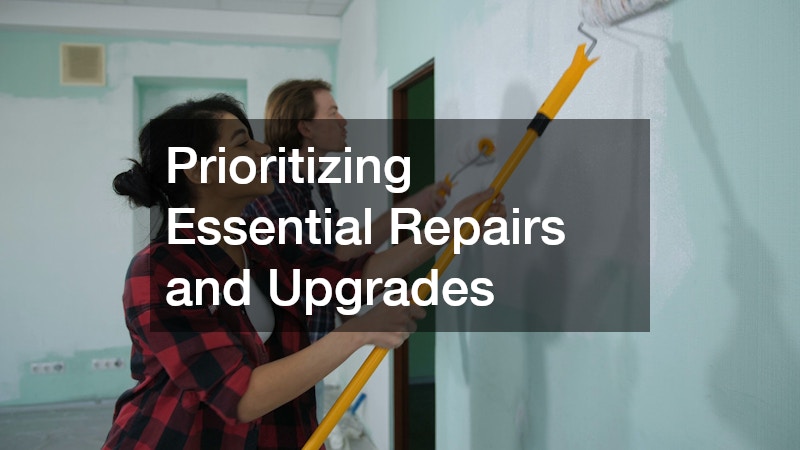Becoming a homeowner is one of the most rewarding and life-changing decisions you can make. Whether you’re moving into a newly built house or an older property full of charm, owning a home comes with a new level of responsibility and opportunity. There’s a distinct difference between renting and owning, and the adjustment requires planning, patience, and a proactive mindset. From managing repairs to understanding your long-term financial obligations, the learning curve can be steep—but also incredibly fulfilling when approached with the right strategies.
To help ease the transition, this article offers practical and actionable advice for new homeowners looking to protect their investment and make smart decisions. As you settle into your new space, it’s important to focus on both short-term needs and long-term planning. Establishing habits and routines early on can save you money, reduce stress, and improve your overall quality of life. Whether it’s understanding insurance, planning upgrades, or simply learning how to fix a leaky faucet, the following tips are designed to offer a blend of general principles and useful specifics.
Creating a Realistic Home Maintenance Schedule
One of the best pieces of advice for new homeowners is to create and stick to a home maintenance schedule. A regular routine helps you avoid costly repairs down the line by identifying minor issues before they grow into major problems. It also spreads out the work, making it more manageable over time. From gutter cleaning to seasonal HVAC checks, many tasks don’t require expertise but do require consistency. Creating this rhythm is an essential part of taking ownership and feeling confident in your space.
More specifically, understanding how certain maintenance tasks affect your immediate environment can also be a helpful perspective. For instance, when dealing with landscaping or pest control, learning about bioconcentration—how toxins build up in living organisms—can influence the choices you make around your property. Opting for non-toxic alternatives and following safety guidelines ensures that your maintenance routine is both effective and environmentally conscious. This layered approach helps new homeowners stay responsible, informed, and future-focused.
Budgeting for Ongoing Homeownership Costs

It’s common for first-time buyers to budget only for the purchase price of their home, without factoring in the many recurring expenses that come with ownership. One of the most important pieces of advice for new homeowners is to create a separate budget for ongoing costs. Property taxes, utilities, maintenance, and unexpected repairs can all take a toll on your finances if you’re not prepared. A well-planned budget provides stability and reduces the chances of dipping into emergency savings or relying too heavily on credit.
Beyond routine expenses, it’s wise to look for creative ways to supplement your income, especially in the early years of homeownership. Some homeowners choose to sell eggs from backyard chickens or start small garden ventures to reduce grocery bills and generate extra cash. While not every homeowner will go this route, exploring passive or part-time income options can ease financial pressure and allow more flexibility in budgeting for repairs, upgrades, or family needs.
Learning the Basics of Your Home’s Systems
One of the most empowering steps a new homeowner can take is to learn the basic systems that keep their home running. Knowing how your electrical, plumbing, and HVAC systems function gives you greater control over maintenance and helps you spot potential issues early. This foundational knowledge allows you to communicate more effectively with professionals and avoid panic during emergencies. It’s not about becoming an expert, but about building enough understanding to take smart, timely action.
A practical place to begin is with your plumbing system. Understanding how your water heater operates, how to shut off the main water supply, and what signs indicate a leak are crucial skills. Calling professional plumbing services is necessary for major problems, but simple tasks like unclogging a drain or fixing a running toilet can often be handled yourself. This kind of hands-on familiarity not only saves money but also builds your confidence—an often-overlooked piece of advice for new homeowners trying to find their footing.
Prioritizing Essential Repairs and Upgrades

As exciting as homeownership can be, the to-do list often feels never-ending. That’s why another key piece of advice for new homeowners is to learn how to prioritize. Not every task requires immediate attention, and distinguishing between cosmetic preferences and structural or safety concerns can help you manage your time and budget more effectively. Focus on the repairs and upgrades that protect your home’s integrity before moving on to projects that simply enhance visual appeal.
For example, your air conditioning unit may not be the most glamorous part of your home, but it plays a vital role in comfort and energy efficiency—especially during hot seasons. If your system is outdated or showing signs of failure, connecting with reputable air conditioning contractors should move to the top of your list. Efficient cooling impacts your monthly utility bills and can prevent long-term damage to the system. Thoughtful decisions like these help new homeowners avoid costly mistakes and maintain a livable space year-round.
Choosing Reliable Local Service Providers
Building a dependable network of service providers is one of the smartest things a new homeowner can do. Whether it’s for routine maintenance or emergency fixes, knowing who to call when something goes wrong can save valuable time and prevent avoidable stress. Ask neighbors, read reviews, and keep a list of vetted professionals handy for services like HVAC repair, pest control, or roofing. This is a form of preparation that pays off in convenience and peace of mind.
Even before move-in day, many new homeowners discover the value of trusted professionals by working with local movers. A quality moving experience sets the tone for your transition and can highlight what to look for in future service relationships—reliability, transparency, and communication. The same standards apply when hiring anyone to work on your property. Advice for new homeowners often centers on budgeting and maintenance, but assembling the right support network is just as essential for long-term success.
Understanding Property Taxes and Insurance
One of the more complex parts of homeownership is understanding how taxes and insurance affect your financial obligations. Property taxes vary by location and can fluctuate annually, while home insurance is essential for protecting your investment. A common piece of advice for new homeowners is to review these costs carefully during the buying process and continue reassessing them regularly. Knowing what’s required—and what’s optional—can help you avoid unpleasant surprises and make smarter financial choices.
When it comes to coverage, not all home insurance plans are created equal. New homeowners should take the time to compare providers and policies, looking closely at what’s included and what additional protection might be necessary. Flood damage, for instance, is often excluded from standard policies and must be added separately. Reading the fine print and speaking with a knowledgeable agent can help ensure you’re adequately covered without overpaying. Understanding these elements early is a vital step toward long-term financial security.
Improving Home Energy Efficiency

Energy efficiency isn’t just about reducing your carbon footprint—it’s also about improving comfort and cutting down on monthly expenses. Advice for new homeowners often includes simple steps like switching to LED bulbs, sealing drafty windows, and upgrading insulation. These choices create a more sustainable home environment while also helping you control heating and cooling costs. Over time, these improvements can lead to noticeable savings and a healthier living space.
As your lifestyle evolves, energy-conscious upgrades may extend beyond insulation and into entertainment. For instance, hiring a professional home theater installation service can allow you to enjoy high-quality entertainment while also improving efficiency. Experts can set up equipment in ways that minimize power usage and avoid overloading circuits. It’s a reminder that energy efficiency and modern convenience aren’t mutually exclusive—especially when thoughtful planning is part of the process.
Establishing Good Safety and Security Habits
Home safety is about more than just locks and alarms—it’s a mindset. Developing good habits around security, emergency planning, and basic safety checks is another core piece of advice for new homeowners. Make it a routine to test smoke detectors, store emergency contacts, and keep your first aid kit stocked. Being proactive not only protects your property but also offers peace of mind for you and your family.
That mindset should extend to common household threats like pests. Something as seemingly small as a mice infestation can lead to health issues, structural damage, and costly repairs if left unchecked. New homeowners should inspect for entry points, keep food stored securely, and consider professional pest inspections as part of their seasonal routine. A secure home starts with attention to detail, and vigilance in this area pays off in both comfort and safety.
Getting Involved in Your Local Community

Building a sense of belonging in your neighborhood is often an overlooked piece of advice for new homeowners. After settling into your new space, making connections with those around you can greatly enhance your quality of life. Whether it’s attending town meetings, supporting local businesses, or volunteering, being involved helps you feel more invested in your environment. It also creates a valuable support network for everything from borrowing tools to staying informed about safety concerns.
For many homeowners, participating in a local church community offers more than just spiritual enrichment—it provides opportunities to meet neighbors, give back, and stay engaged. Churches often organize events, charitable initiatives, and social gatherings that bring people together across generations. Joining such a community can help new homeowners transition from feeling like outsiders to feeling like long-term residents who are part of something larger than themselves.
Planning for Future Home Improvements
As the initial rush of moving in begins to fade, it’s wise to start thinking long-term. A smart piece of advice for new homeowners is to plan upgrades over time, based on both needs and lifestyle preferences. Creating a wish list of changes and spreading them across months or years makes renovations less overwhelming. Whether it’s converting a garage into a gym or remodeling the kitchen, having a plan helps you prioritize and stay within budget.
One creative way to gather inspiration is to explore design ideas during outings. Dining at a waterfront restaurant, for instance, might spark ideas for outdoor living spaces, landscaping features, or layout changes that mirror a relaxed, elegant atmosphere. Drawing from experiences beyond your property can help shape your vision for what your home can become. Keeping your eyes open in everyday settings is a surprisingly practical tool for developing your improvement roadmap.
Homeownership is both a responsibility and a privilege. While the journey may begin with a mortgage and a set of keys, it quickly evolves into something far more personal. It’s a place to build routines, explore dreams, and create memories. The best advice for new homeowners isn’t just about fixing what’s broken or budgeting wisely—it’s about shaping a lifestyle that supports well-being, financial health, and personal growth. Every decision, from choosing lightbulbs to planning major renovations, contributes to how you experience and enjoy your home.
By focusing on maintenance, budgeting, upgrades, and community connection, new homeowners can set themselves up for long-term success. Learning about your home’s systems and assembling a network of reliable professionals can save you stress and money. Prioritizing sustainability, security, and meaningful social involvement helps you transform a house into a true home. Whether you’re handling basic repairs or envisioning your dream kitchen, the choices you make today will shape the years ahead. Take your time, trust the process, and revisit this advice for new homeowners whenever you need a steady foundation to return to.
Homeownership also invites you to think more intentionally about how your living space reflects your values and lifestyle. From choosing eco-conscious upgrades to incorporating personal touches that bring comfort and joy, your home becomes an extension of who you are. One of the most valuable pieces of advice for new homeowners is to view your home not just as a structure, but as a living environment that evolves with your needs and ambitions. Take time to appreciate each milestone—big or small—and celebrate the progress you make along the way.
As your experience grows, you’ll likely find that challenges become opportunities for learning and growth. Whether it’s fixing something for the first time or finding creative solutions to daily issues, you’ll continue building confidence. With patience, resourcefulness, and the right mindset, your home will not only support your life but also inspire it. Keep learning, stay engaged, and enjoy the journey of homeownership.





